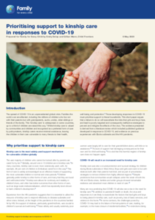Introduction
The spread of COVID-19 is an unprecedented global crisis. Families the world over are affected, including the millions of children who live not with their parents but with grandparents, aunts, uncles, older siblings or friends of the family. This ‘kinship care’ is widespread; in some countries, up to a third of children are raised this way. Whilst kinship care is valued by communities and children and recognised as a preferred form of care by policymakers, kinship carers receive minimal assistance, leaving the children in their care vulnerable to many threats to their health, well-being and protection. Those developing responses to COVID-19 must prioritise support to these households. This short paper argues that a failure to do so will exacerbate the risks that girls and boys face, and lead to poorly targeted and consequently ineffective strategies to prevent and mitigate the effects of the virus. The evidence presented is derived from a literature review which included published guidance developed in response to COVID-19, and evidence on previous experiences with Ebola outbreaks and the HIV pandemic.

